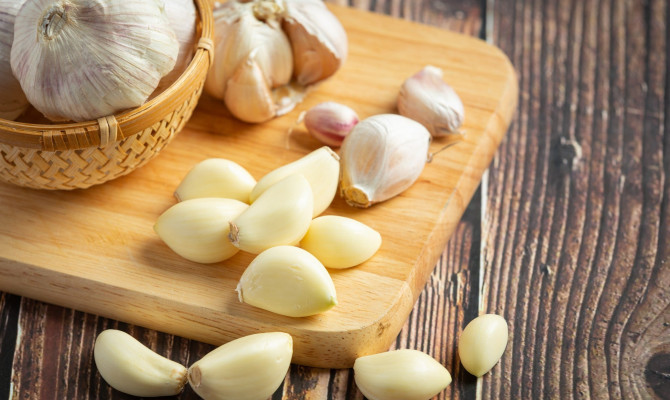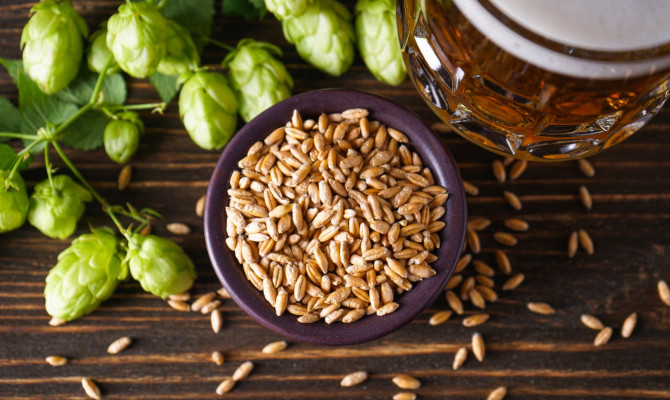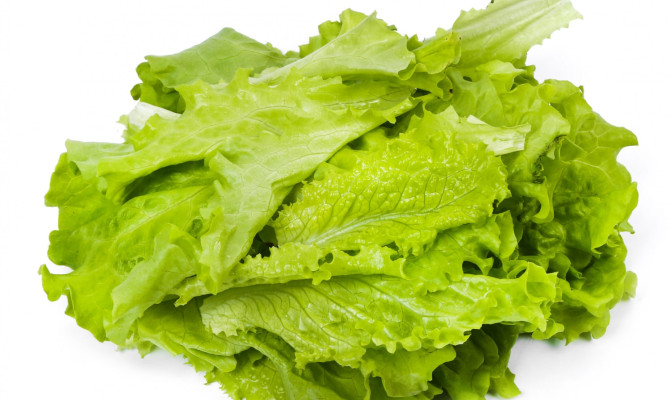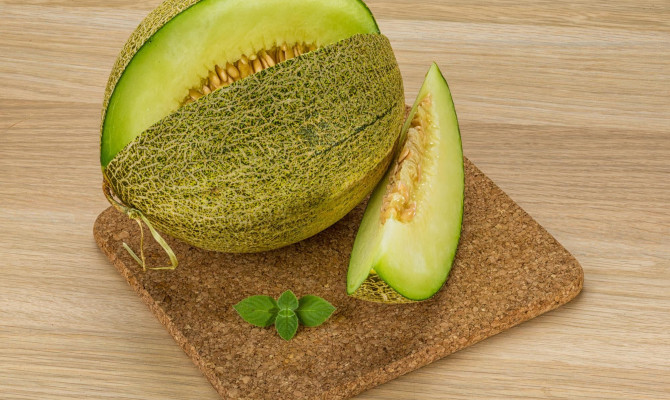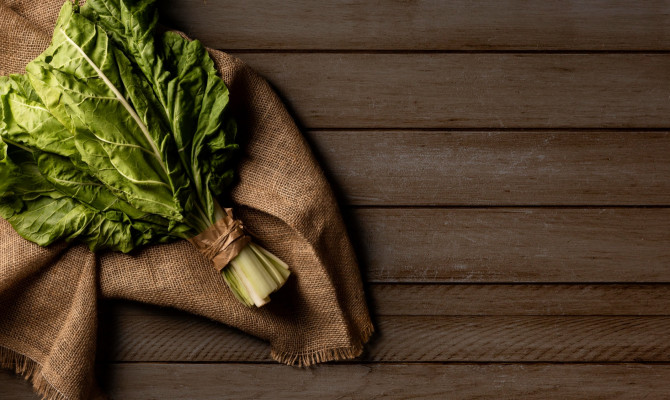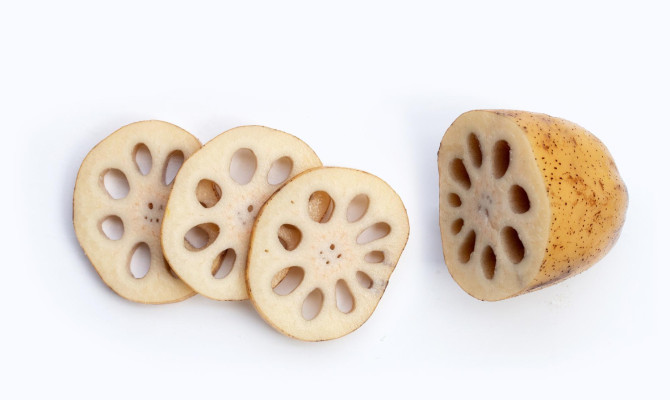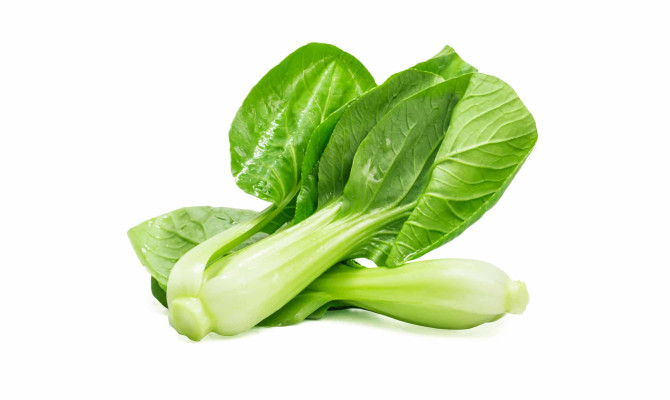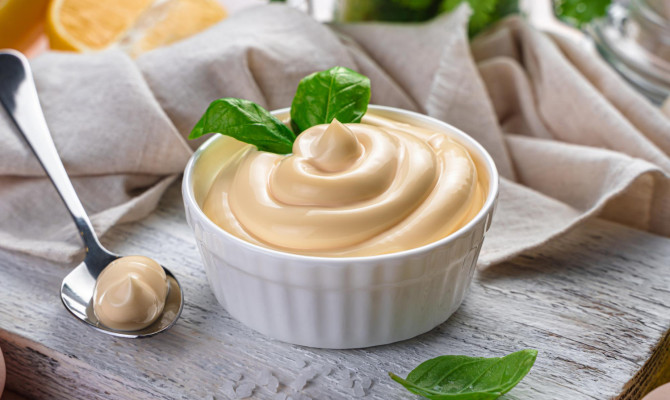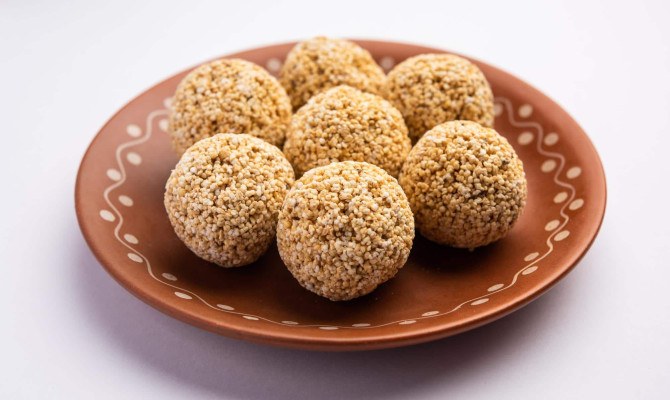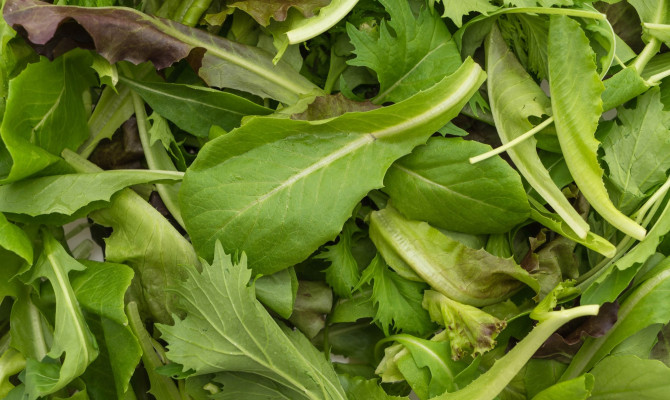Health Benefits of Broccoli

- Broccoli
- 17 Aug 2023
Overview
What is Broccoli?
Broccoli (Brassica oleracea) is a green vegetable belonging to the Brassicaceae (cabbage family). Its leaves, flowering head, and stalks are eaten as vegetables. Broccoli has a dark green flower head arranged in a tree-like structure emerging from a light green thick stalk.
Broccoli looks similar to cabbage in appearance. The plant parts growing above the ground are used in making medicines. Broccoli is eaten as a vegetable throughout the world.
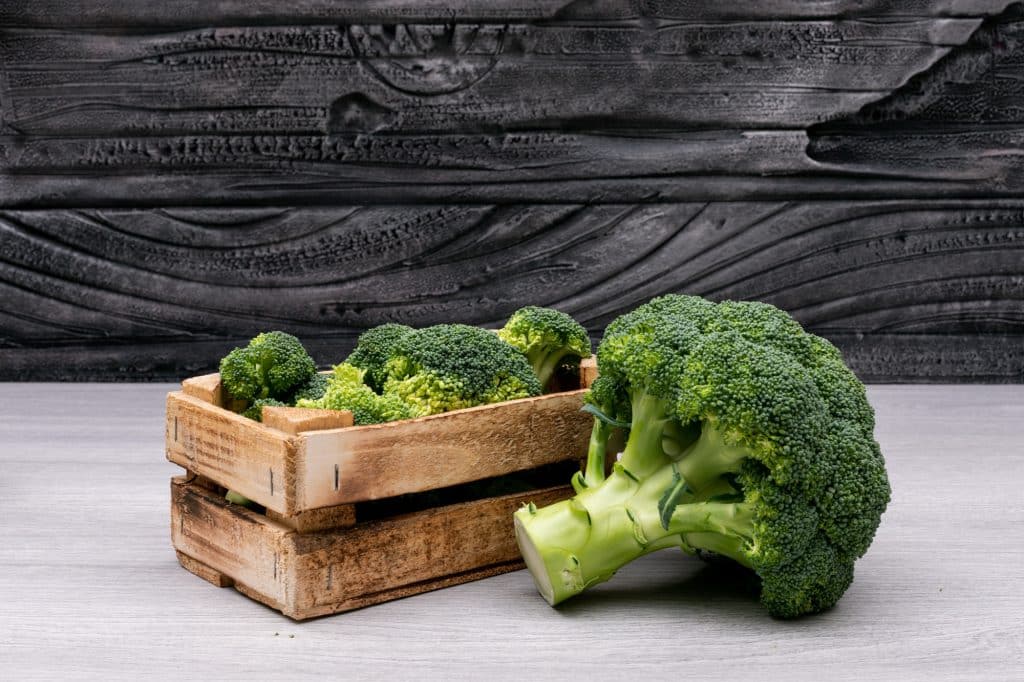
Facts of Broccoli
- Broccoli is believed as a superfood as it is low in calories with many beneficial nutrients.
- Broccoli is indigenous to Asia and the Mediterranean region
- Broccoli is a cold weather crop that grows best at temperatures ranging from 18 to 23-degree centigrade
- One can only harvest broccoli with hands, and it cannot be machine harvested
- In California, United States, Broccoli is cultivated throughout the year 1Overview| Researched based study from Sciencedirect.com
Nutrition
Nutrition in Broccoli
Raw broccoli contains 90% water and only 10% other nutrients.
The nutrients present in 90 grams of raw broccoli are as follows
- Calories-35
- Carbohydrate-5.6 gm (gram)
- Protein-2.3 gm
- Fiber-2.2 gm
- Fat- 0.3 gm
- Vitamin B9(Folate)- 15% of DV (daily value)
- Vitamin K-77% of DV
- Vitamin C-91% of DV
Besides these, it also contains fibers and a small amount of iron, calcium, magnesium, and potassium.
Carbohydrate and fiber has the following function in our body
Carbohydrate
- It provides energy to all cells of the body
- It also helps in breaking down protein molecules
Fiber
- It helps absorb water and speed up the movement of stool in the intestine
- It prevents constipation and improves the gut health
Vitamins and minerals in broccoli
Vitamin B9 (Folate)
- It is needed for the synthesis of white and red blood cells
- It helps in normal tissue growth and cell functioning
Vitamin K1
- It is for the healing (blood clotting) process in our body
- It maintains the bone health
Vitamin C
- It is indispensable for the growth and repair of the tissues
- It is important for healthy skin and bones
Manganese
- It helps bodily processes to function properly
- It helps strengthen the bones
Iron
- It helps in the transport of oxygen from the lungs to the tissues
- It is required for growth and development
Potassium
- It is vital for proper nerve and muscle functioning
- It is essential for regulating the blood pressure in our body 2Nutrition| Researched based study from Usda.gov
Bioactive compounds in broccoli
Carotenoids
- Carotenoids are natural pigments present in the plants
- Broccoli contains carotenoids viz; beta-carotene, zeaxanthin, and lutein
- It helps in maintaining the eye health
Indole-3-carbinol
- It is a natural compound found in vegetables
- It might help prevent the abnormal cell growth
Sulforaphane
- It is a natural compound in vegetables and is most abundant in broccoli
- It nullifies the free radicals in our body and helps prevent cell damage
Quercetin
- It is a natural pigment present in plants
- It reduces pain and swelling
- It prevents cell damage and regulates blood pressure
Kaempferol
- It is a naturally occurring polyphenol compound present in plants
- It nullifies the free radicals in the body and prevents cell damage
- It inhibits the abnormal cell growth 3Nutrition| Researched based study from Nlm.nih.gov
Health Benefits
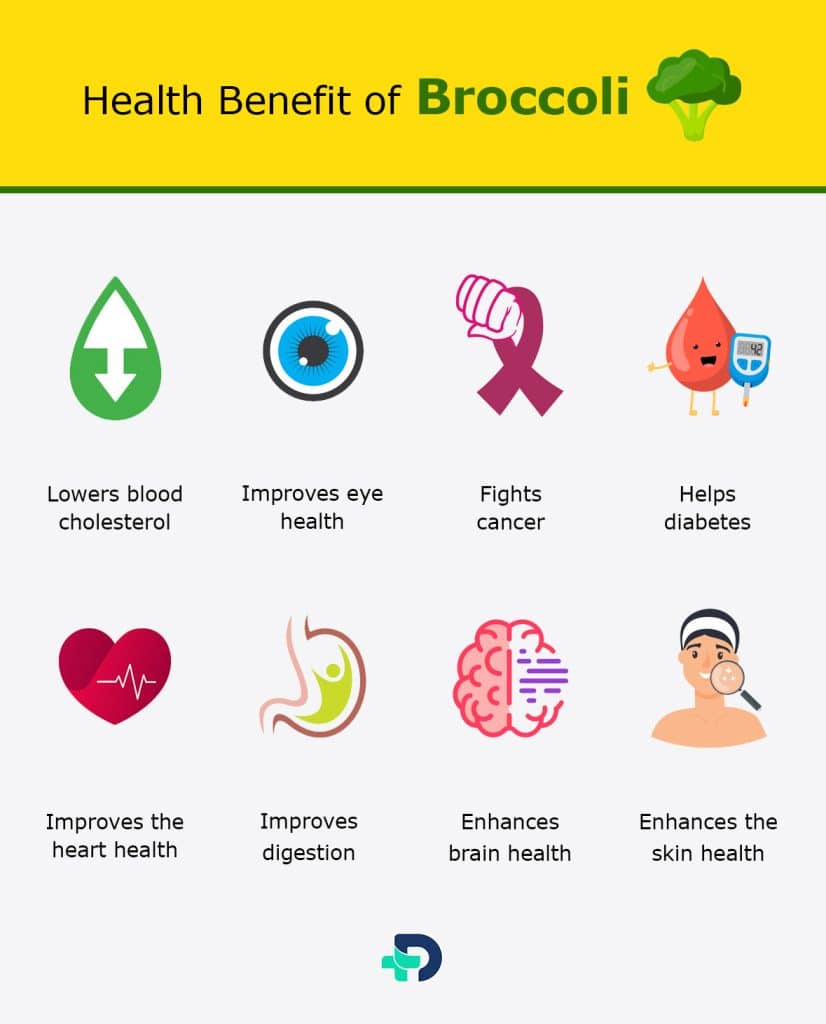
Health Benefits of Broccoli
The health benefits of broccoli are as follows
- Lowers blood cholesterol
- Improves eye health
- Fights cancer
- Helps diabetes
- Improves the heart health
- Improves digestion
- Enhances brain health
- Supports oral health
- Strengthen the bones
- Enhances the skin health
Lowers blood cholesterol
- Substances in broccoli bind with bile acids and increase their excretion, which results in new bile acid synthesis from the cholesterol. Hence, it decreases the total cholesterol in our body.
- It reduces the risk of chronic diseases 4Health benefits| Researched based study from Nlm.nih.gov
Improves eye health
- Nutrients in broccoli decrease the risk of age-related macular degeneration.
- It decreases the risk of night blindness. Night blindness is when a person has vision problems in dim light 5Health benefits| Researched based study from Nlm.nih.gov
Fights cancer
- Sulforaphane in broccoli reduces oxidative stress and inhibits abnormal cell growth.
- It reduces the risk of stomach, lung, breast, and prostate cancer 6Health benefits| Researched based study from Nlm.nih.gov
Helps diabetes
- Broccoli decreases insulin resistance in type 2 diabetes
- It regulates the blood sugar 7Health benefits| Researched based study from Nlm.nih.gov
Improves the heart health
- Broccoli supplements decrease the bad cholesterol (low-density lipoprotein) in the body.
- It reduces the risk of heart diseases 8Health benefits| Researched based study from Nlm.nih.gov
Improves digestion
- Nutrients in broccoli promote the growth of beneficial bacteria in the gut
- It decreases constipation and supports bowel regularity 9Health benefits| Researched based study from Nlm.nih.gov
Enhances brain health
- Bio-actives in broccoli decrease the memory loss
- It improves the mental ability and thinking processes 10Health benefits| Researched based study from Nlm.nih.gov
Supports oral health
- Nutrients in broccoli reduce the risk of oral cancers
- It reduces the risk of dental diseases 11Health benefits| Researched based study from Nlm.nih.gov
Strengthen the bones
- Nutrients in broccoli lessen the risk of joint disorders
- It reduces the risk of osteoarthritis 12Health benefits| Researched based study from Nlm.nih.gov
Enhances the skin health
- Bio-actives in broccoli protect the skin from the ultraviolet radiation of the sun.
- It reduces the risk of skin cancer 13Health benefits| Researched based study from Nlm.nih.gov
However, more research is warranted to prove the effect of broccoli on skin health.
Side effects
Side effects of Broccoli
Most people can well tolerate broccoli. However, some people might experience the following:
- Itching
- Hives
- Swelling in the lips, face, tongue, and mouth
- Difficult breathing
- Also, overeating broccoli might lead to excess stomach gas and flatulence.
- Broccoli contains goitrogens. Goitrogens are substances that impact thyroid function if consumed in huge quantities. But cooking broccoli is known to destroy the enzyme that activates the goitrogens. Hence, one should consume raw broccoli in moderation to avoid unwanted side effects 14Side effects| Researched based study from Nlm.nih.gov
who should consume broccoli in moderation
- People with thyroid problems
- People with gas problem
- People on blood thinning medication
- People allergic to substances in broccoli or other cruciferous vegetables 15Side effects| Researched based study from Sciencedirect.com
Precautions
Precautions to be taken when having Broccoli
- Broccoli is generally safe when consumed in food amounts. However, more data is required to determine if broccoli is safe when consumed in large amounts as medicine.
- Nursing mothers and pregnant women must avoid consuming broccoli in large amounts as medicines due to inadequate information on the safety and efficiency of these groups.
Tips
Tips for incorporating Broccoli into the diet
- One can add broccoli to other vegetables and take it with rice meals
- One can chop thin broccoli pieces into their pasta dish
- One can chop boiled broccoli into soups to enhance the taste
- One can also blend broccoli with smoothies
- One can steam or bake the broccoli, sprinkle it with pepper and salt, and have it as a side dish.
- One can also add steamed or raw broccoli to salads and enhance the taste
- Adding broccoli, beans, peas, and carrots to fried rice makes it even healthier 16Tips| Researched based study from Sciencedirect.com
Interactions
Interactions of Broccoli
Warfarin
- Warfarin is an anticoagulant (blood-thinning medication)
- Broccoli contains vitamin K, which helps in blood clotting
- Taking broccoli and warfarin together might increase the risk of blood clotting and decrease the efficiency of the drug
Medication broken down by the liver
- Taking broccoli and medication changed by the liver, such as cytochrome P450 1A2 and cytochrome P450 2A6, might alter the drug-breaking time by the liver.
- It might decrease the drug’s effect and increase its side effect 17Interactions| Researched based study from Nlm.nih.gov
Storage
Selection & Storage of Broccoli
- One should select broccolis that are dark green and firm to touch and avoid pieces that are yellow or wilting.
Storage
- One must store broccoli unwashed in loose perforated bags in the refrigerator.
- One must avoid washing before storing as excess moisture might encourage molds to grow.
- One must wash the broccolis only before cooking
- One must consume the stored broccoli within 3 to 5 days
Takeaway
Key takeaways
- Broccoli is a nutrient-enriched vegetable with multiple health benefits
- It also contains a considerable amount of fiber good for the gut health
- Broccoli is simple to prepare and can be consumed in both raw and cooked form .
- It can be an excellent addition to a healthy balanced diet
Any feedback on this article?
 This Articles content was accurate
This Articles content was accurate Very Informative Article
Very Informative Article I have a question or a comment
I have a question or a comment
 This article contains inaccurate content
This article contains inaccurate content This article was not helpful
This article was not helpful I have a question or a comment
I have a question or a comment
We appreciate your helpful feedback!
Checkout our social pages
References
-
Science Direct
Broccoli | Overview
-
U.S. DEPARTMENT OF AGRICULTURE
Broccoli, raw | Nutrition
-
National Library of Medicine
Glucosinolates and isothiocyanates in health and disease | Nutrition
-
National Library of Medicine
Steam cooking significantly improves in vitro bile acid binding of collard greens, kale, mustard greens, broccoli, green bell pepper, and cabbage | Benefits
-
National Library of Medicine
Lutein and Zeaxanthin and Their Roles in Age-Related Macular Degeneration-Neurodegenerative Disease | Benefits
-
National Library of Medicine
Cruciferous Vegetable Consumption and Stomach Cancer: A Case-Control Study | Benefits
-
National Library of Medicine
Effect of broccoli sprouts on insulin resistance in type 2 diabetic patients: a randomized double-blind clinical trial | Benefits
-
National Library of Medicine
Broccoli sprouts powder could improve serum triglyceride and oxidized LDL/LDL-cholesterol ratio in type 2 diabetic patients: a randomized double-blind placebo-controlled clinical trial | Benefits
-
National Library of Medicine
Clinical and molecular evidence of the consumption of broccoli, glucoraphanin and sulforaphane in humans | Benefits
-
National Library of Medicine
Nutrients and bioactives in green leafy vegetables and cognitive decline: Prospective study | Benefits
-
National Library of Medicine
Prevention of Carcinogen-Induced Oral Cancer by Sulforaphane'. Cancer Prev Res | Benefits
-
National Library of Medicine
Sulforaphane protects human chondrocytes against cell death induced by various stimuli | Benefits
-
National Library of Medicine
Sulforaphane mobilizes cellular defenses that protect skin against damage by UV radiation | Benefits
-
National Library of Medicine
Various Possible Toxicants Involved in Thyroid Dysfunction: A Review - PMC | Side effects
-
Science Direct
Health benefits and possible risks of broccoli – An overview | Risk
-
Science Direct
Application of different cooking methods to improve nutritional quality of broccoli (Brassica oleracea var. italica) regarding its compounds content with antioxidant activity | Tips
-
National Library of Medicine
Of blood, bones, and broccoli: warfarin-vitamin K interactions'. Home Healthc Nurse. | Interactions












